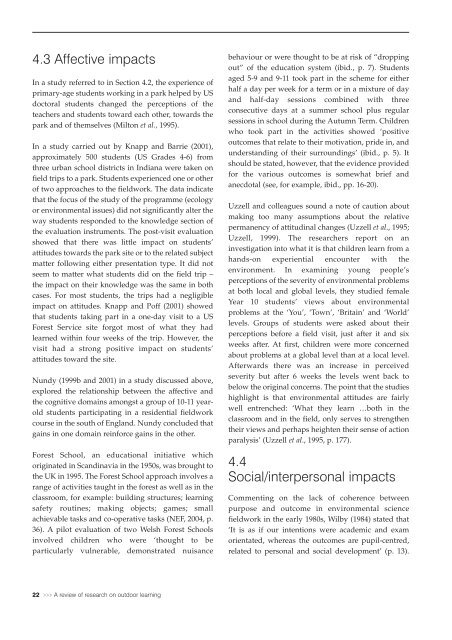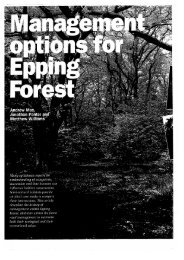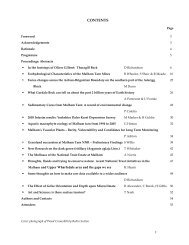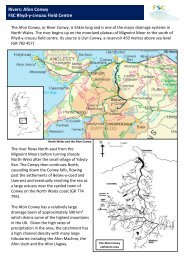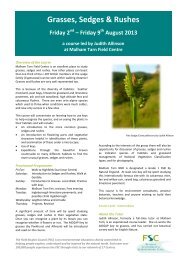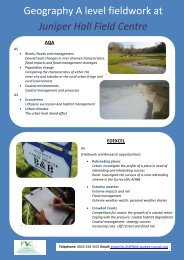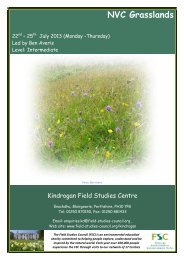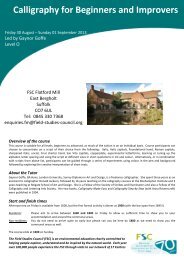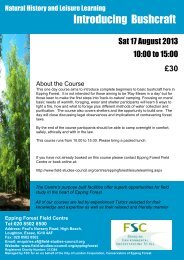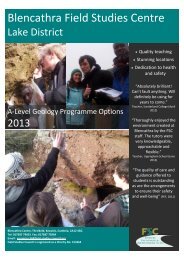A review of research on outdoor learning - Field Studies Council
A review of research on outdoor learning - Field Studies Council
A review of research on outdoor learning - Field Studies Council
- No tags were found...
You also want an ePaper? Increase the reach of your titles
YUMPU automatically turns print PDFs into web optimized ePapers that Google loves.
4.3 Affective impactsIn a study referred to in Secti<strong>on</strong> 4.2, the experience <str<strong>on</strong>g>of</str<strong>on</strong>g>primary-age students working in a park helped by USdoctoral students changed the percepti<strong>on</strong>s <str<strong>on</strong>g>of</str<strong>on</strong>g> theteachers and students toward each other, towards thepark and <str<strong>on</strong>g>of</str<strong>on</strong>g> themselves (Milt<strong>on</strong> et al., 1995).In a study carried out by Knapp and Barrie (2001),approximately 500 students (US Grades 4-6) fromthree urban school districts in Indiana were taken <strong>on</strong>field trips to a park. Students experienced <strong>on</strong>e or other<str<strong>on</strong>g>of</str<strong>on</strong>g> two approaches to the fieldwork. The data indicatethat the focus <str<strong>on</strong>g>of</str<strong>on</strong>g> the study <str<strong>on</strong>g>of</str<strong>on</strong>g> the programme (ecologyor envir<strong>on</strong>mental issues) did not significantly alter theway students resp<strong>on</strong>ded to the knowledge secti<strong>on</strong> <str<strong>on</strong>g>of</str<strong>on</strong>g>the evaluati<strong>on</strong> instruments. The post-visit evaluati<strong>on</strong>showed that there was little impact <strong>on</strong> students’attitudes towards the park site or to the related subjectmatter following either presentati<strong>on</strong> type. It did notseem to matter what students did <strong>on</strong> the field trip –the impact <strong>on</strong> their knowledge was the same in bothcases. For most students, the trips had a negligibleimpact <strong>on</strong> attitudes. Knapp and P<str<strong>on</strong>g>of</str<strong>on</strong>g>f (2001) showedthat students taking part in a <strong>on</strong>e-day visit to a USForest Service site forgot most <str<strong>on</strong>g>of</str<strong>on</strong>g> what they hadlearned within four weeks <str<strong>on</strong>g>of</str<strong>on</strong>g> the trip. However, thevisit had a str<strong>on</strong>g positive impact <strong>on</strong> students’attitudes toward the site.Nundy (1999b and 2001) in a study discussed above,explored the relati<strong>on</strong>ship between the affective andthe cognitive domains am<strong>on</strong>gst a group <str<strong>on</strong>g>of</str<strong>on</strong>g> 10-11 yearoldstudents participating in a residential fieldworkcourse in the south <str<strong>on</strong>g>of</str<strong>on</strong>g> England. Nundy c<strong>on</strong>cluded thatgains in <strong>on</strong>e domain reinforce gains in the other.Forest School, an educati<strong>on</strong>al initiative whichoriginated in Scandinavia in the 1950s, was brought tothe UK in 1995. The Forest School approach involves arange <str<strong>on</strong>g>of</str<strong>on</strong>g> activities taught in the forest as well as in theclassroom, for example: building structures; <strong>learning</strong>safety routines; making objects; games; smallachievable tasks and co-operative tasks (NEF, 2004, p.36). A pilot evaluati<strong>on</strong> <str<strong>on</strong>g>of</str<strong>on</strong>g> two Welsh Forest Schoolsinvolved children who were ‘thought to beparticularly vulnerable, dem<strong>on</strong>strated nuisancebehaviour or were thought to be at risk <str<strong>on</strong>g>of</str<strong>on</strong>g> “droppingout” <str<strong>on</strong>g>of</str<strong>on</strong>g> the educati<strong>on</strong> system (ibid., p. 7). Studentsaged 5-9 and 9-11 took part in the scheme for eitherhalf a day per week for a term or in a mixture <str<strong>on</strong>g>of</str<strong>on</strong>g> dayand half-day sessi<strong>on</strong>s combined with threec<strong>on</strong>secutive days at a summer school plus regularsessi<strong>on</strong>s in school during the Autumn Term. Childrenwho took part in the activities showed ‘positiveoutcomes that relate to their motivati<strong>on</strong>, pride in, andunderstanding <str<strong>on</strong>g>of</str<strong>on</strong>g> their surroundings’ (ibid., p. 5). Itshould be stated, however, that the evidence providedfor the various outcomes is somewhat brief andanecdotal (see, for example, ibid., pp. 16-20).Uzzell and colleagues sound a note <str<strong>on</strong>g>of</str<strong>on</strong>g> cauti<strong>on</strong> aboutmaking too many assumpti<strong>on</strong>s about the relativepermanency <str<strong>on</strong>g>of</str<strong>on</strong>g> attitudinal changes (Uzzell et al., 1995;Uzzell, 1999). The <str<strong>on</strong>g>research</str<strong>on</strong>g>ers report <strong>on</strong> aninvestigati<strong>on</strong> into what it is that children learn from ahands-<strong>on</strong> experiential encounter with theenvir<strong>on</strong>ment. In examining young people’spercepti<strong>on</strong>s <str<strong>on</strong>g>of</str<strong>on</strong>g> the severity <str<strong>on</strong>g>of</str<strong>on</strong>g> envir<strong>on</strong>mental problemsat both local and global levels, they studied femaleYear 10 students’ views about envir<strong>on</strong>mentalproblems at the ‘You’, ‘Town’, ‘Britain’ and ‘World’levels. Groups <str<strong>on</strong>g>of</str<strong>on</strong>g> students were asked about theirpercepti<strong>on</strong>s before a field visit, just after it and sixweeks after. At first, children were more c<strong>on</strong>cernedabout problems at a global level than at a local level.Afterwards there was an increase in perceivedseverity but after 6 weeks the levels went back tobelow the original c<strong>on</strong>cerns. The point that the studieshighlight is that envir<strong>on</strong>mental attitudes are fairlywell entrenched: ‘What they learn …both in theclassroom and in the field, <strong>on</strong>ly serves to strengthentheir views and perhaps heighten their sense <str<strong>on</strong>g>of</str<strong>on</strong>g> acti<strong>on</strong>paralysis’ (Uzzell et al., 1995, p. 177).4.4Social/interpers<strong>on</strong>al impactsCommenting <strong>on</strong> the lack <str<strong>on</strong>g>of</str<strong>on</strong>g> coherence betweenpurpose and outcome in envir<strong>on</strong>mental sciencefieldwork in the early 1980s, Wilby (1984) stated that‘It is as if our intenti<strong>on</strong>s were academic and examorientated, whereas the outcomes are pupil-centred,related to pers<strong>on</strong>al and social development’ (p. 13).22 >>> A <str<strong>on</strong>g>review</str<strong>on</strong>g> <str<strong>on</strong>g>of</str<strong>on</strong>g> <str<strong>on</strong>g>research</str<strong>on</strong>g> <strong>on</strong> <strong>outdoor</strong> <strong>learning</strong>


